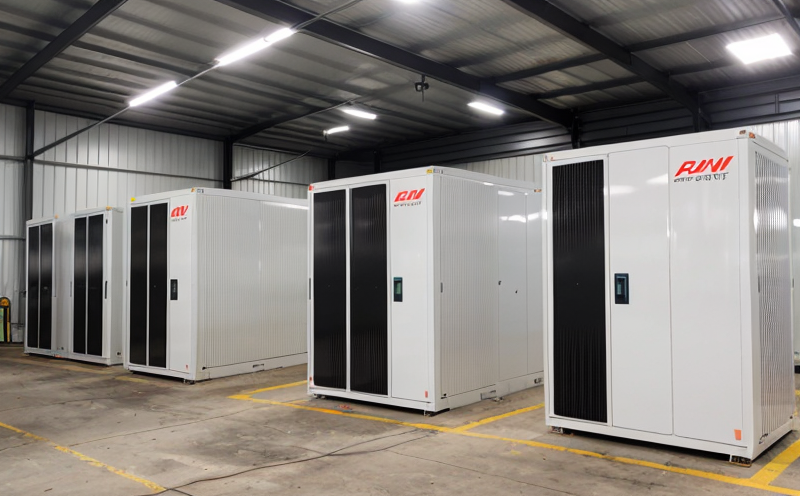IEC 62932 Safety Testing of Flow Battery Systems
The International Electrotechnical Commission (IEC) Standard IEC 62932 sets forth comprehensive safety requirements for flow battery systems, which are crucial components in renewable energy storage. This standard ensures that these systems meet stringent safety and performance criteria to protect both the operators and the environment.
Flow batteries represent a significant advancement in energy storage technology due to their unique architecture: they use two chemical solutions stored in external tanks, which flow through an electrochemical cell where they react to produce electricity. The ability to store large amounts of power for extended periods makes them ideal for grid-scale applications and off-grid installations.
IEC 62932 addresses critical safety concerns such as pressure resistance, temperature stability, chemical compatibility, mechanical integrity, and electrical safety. This ensures that flow batteries can operate reliably under various environmental conditions and meet the highest standards of safety.
The testing procedure outlined in IEC 62932 is designed to simulate real-world operational scenarios, ensuring that the battery system behaves predictably and safely when subjected to stress. Testing covers a range of parameters including:
- Pressure resistance under various operating conditions
- Thermal stability during charging and discharging cycles
- Chemical compatibility between the electrolytes
- Mechanical integrity of the tanks and piping systems
- Electrical safety, including insulation resistance and short-circuit protection
The testing process involves several key steps:
- Preparation of test samples according to IEC 62932 specifications
- Conducting pressure tests to ensure structural integrity under various operational pressures
- Thermal cycling tests to assess the battery’s performance and stability at different temperatures
- Evaluating chemical compatibility between the electrolytes through compatibility tests
- Mechanical stress testing of the tanks and piping systems
- Electrical safety checks, including insulation resistance measurement and short-circuit current determination
The results from these tests are critical for ensuring that flow battery systems meet the stringent requirements set by IEC 62932. Compliance with this standard is essential for manufacturers to gain market access in many countries and ensure their products can be safely deployed.
Compliance with IEC 62932 also helps companies demonstrate their commitment to safety, reliability, and environmental responsibility. This is particularly important given the growing emphasis on renewable energy storage solutions that are both efficient and safe.
Benefits
The benefits of IEC 62932 Safety Testing of Flow Battery Systems extend beyond mere compliance; they offer substantial advantages for manufacturers, operators, and end-users:
- Enhanced Safety: Ensures that flow batteries operate safely under all conditions, reducing the risk of accidents or failures.
- The standard addresses critical safety aspects such as pressure resistance and electrical integrity.
- Regulatory Compliance: Helps manufacturers meet regulatory requirements in various countries, facilitating market entry.
- Increased Reliability: Through rigorous testing, the reliability of flow batteries is significantly enhanced, leading to longer operational lifespans and reduced maintenance costs.
- The standard ensures that the battery systems perform consistently over time, even under harsh conditions.
- Better Environmental Performance: By ensuring safe operation, IEC 62932 helps reduce the risk of environmental contamination and waste.
In summary, compliance with IEC 62932 not only ensures safety but also supports broader goals related to sustainability and regulatory adherence. This is particularly important for companies operating in competitive markets where reputation and reliability are key differentiators.
Quality and Reliability Assurance
IEC 62932 Safety Testing of Flow Battery Systems plays a pivotal role in ensuring the highest standards of quality and reliability. By conducting comprehensive tests, this standard helps manufacturers identify potential weaknesses early on, allowing for corrective actions before mass production.
The testing process is designed to simulate real-world conditions as closely as possible, which allows for accurate assessment of how flow battery systems will perform in various environments. This includes:
- Pressure resistance under varying operational pressures
- Thermal stability at different temperature ranges
- Mechanical integrity during typical usage scenarios
- Electrical safety checks to prevent short circuits and other electrical hazards
The rigorous testing process ensures that flow battery systems meet the highest standards of quality, reliability, and durability. This is crucial for operators who rely on these systems to provide stable power supply in critical applications such as grid storage, backup power systems, and renewable energy integration.
By adhering to IEC 62932, manufacturers can build trust with their customers by demonstrating a commitment to producing safe, reliable, and efficient flow battery systems. This is especially important given the growing demand for sustainable and resilient energy solutions.
Use Cases and Application Examples
| Use Case/Application Example | Description |
|---|---|
| Grid-Scale Energy Storage | Battery systems are used to store excess energy generated from renewable sources, ensuring a stable power supply. |
| Off-Grid Renewable Energy Systems | Flow batteries provide reliable backup power in remote locations where grid connectivity is limited or non-existent. |
| Renewable Integration | The system helps integrate renewable energy sources into the existing electrical grid, enhancing its flexibility and resilience. |
| Data Center Backup Power | Battery systems ensure continuous operation of data centers during power outages, preventing downtime and data loss. |
| Emergency Response Systems | The system provides reliable backup power for emergency response vehicles and facilities in case of grid failures or natural disasters. |
| Homes and Buildings | Flow batteries can be used to provide energy storage solutions for individual homes or buildings, reducing reliance on the grid. |
| Rural Electrification | The system helps electrify rural areas by providing reliable power through flow battery systems that are easier to transport and install. |
These use cases demonstrate the versatility of IEC 62932 Safety Testing in ensuring that flow battery systems can be safely deployed across a wide range of applications. The standard's comprehensive approach ensures that these systems perform reliably, even in challenging environments.





